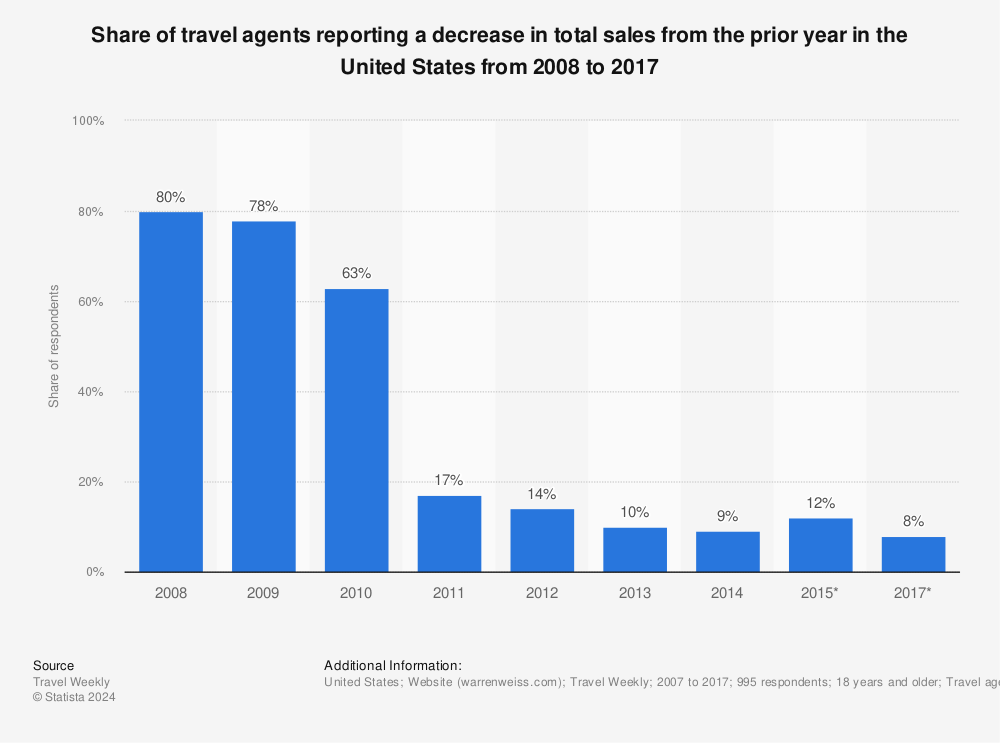If you are starting to build or currently managing a travel agency, you must have felt a growing number of travel business challenges at one point or the other — new competitors opening shop or serving the same market as you do, more easy-to-use and comprehensive services offered online, and more sophisticated customers now going online for booking hotels and airlines, bypassing your business.
You, the travel agency operator, are not alone.
Data from Statista showed declining sales growth among travel agents in the United States since 2011. This trend might not be as bad in other markets such as in the Philippines, but soon as Internet penetration and improvement in broadband connections and market among agents reach saturation point, decline is also not a distant possibility.

Find more statistics at Statista
The travel business challenges are obvious, but the first step towards finding a solution is to identify them.
1. Your agency lacks brand awareness.
While your company may have existed long before Expedia, TripAdvisor, Booking.com, Agoda and other travel booking sites, it may not have the clout and popularity these portals have. Worse, what used to be specialty shops have provided complementary services to corner the market by offering what it needs.
For example, AirBnB used to just specialize hosting accommodations, but it now offers guided tours. Airlines like Cathay Pacific and Singapore Airlines have also been offering travel packages on top of airline seats. Lack of brand awareness results in less loyalty as customers may consider your company just “one of the options” and not the go-to place to transact business should they plan to travel.
2. People are now more knowledgeable about travel.
Travel agencies used to function more on facilitating bookings (best hotel location, cheapest airline schedule, what to do where, etc) but travel has become easier for most people to plan by themselves.
Certainly the Internet presence has made things convenient to all as information is readily available: blogs that advise on things to do and watch out for, reviews on airlines, tour guides and hotel rooms, and a community of people ready to answer those who ask.
So travel agencies need to innovate and provide more than what they’re known to do. But if you’re a progressive entrepreneur, you’ll look at these challenges — shrinking market, growing competition online, more knowledgeable market — as an opportunity for growth. The additional knowledge people acquire makes them open to carefully crafted new ideas and specialized services aimed at more discriminating customers.
3. People are now more technology savvy and have better access to devices.
People are now more engaged with their mobile devices, exposed to nifty websites that feature all-in-one travel experience. They simply indicate their preferred activity, destination or budget and they’re presented with custom travel packages.
Such one-stop portals take care of needs from visa and travel insurance application, to flight, hotel and custom tour booking. While this has become the trend, there are still people who prefer the old way and knock on your shop’s door to get advice. But such demographic may be dwindling and their loyalty no longer guaranteed.
You need to innovate and adapt to the needs of these people. Do you have a website that ranks well on search engine or fits on mobile devices seamlessly? Or have you made your service known in social networking sites and building relationships with corporations? Transitioning to these new innovations could eventually save you time and money so think about it.
4. Customers get attracted by offers too lucrative to refuse
Businesses may be in touch with their customers through personalized services and more intimate attention to their needs, but forward-thinking businesses involve engagement through customer loyalty programs, email communications with content based on previous purchases and interests.
For example, hotels.com has offered extra night free of charge who has accumulated ten days of single or multiple hotel stays. This makes people stick to booking to their website to avail of such offers. Asiamiles has partnered with merchants to extend what accumulated miles can redeem more than just free flights and seat upgrades — restaurant discounts, electronic gadgets or movie tickets. As new deals from different parties emerge all the time, customer loyalty has generally decreased, these types of aggressive and costly offers are meant to retain customers.
Certainly not all travel agents can come up with something similar to wow their customers, but certainly an age-old way of customer service may just be enough for certain travelers to win their trust, loyalty and retain their business.
5.Customers are offered more choice than ever.
For traveling parties — solo, honeymoon, business or family — they are certainly not short of options on arranging their trips, even when adding dimension on their travel. Solo traveler may go backpacking or wellness, or honeymooners may go for voluntourism / volunteer holidays or cruise holidays.
With more deals and alternatives, shopping for the right travel experience can be done independently rather than performed by the expertise of travel agencies.
6. Price is more transparent than ever.
As more hotels compete for guests to increase their room occupancy rate, and airlines slashing prices by squeezing seats and removing conventional amenities like meals and newspapers, travelers have become more sensible to shop for the best deal available, and certainly won’t be fooled into paying extra when there are cheaper options out there.
Now, travelers also know what to expect with different pricing levels so they won’t easily be convinced to pay something on an outcome they’re not willing to experience.
Agencies have to find a better way to stay relevant and making money at the same time.
Conclusion
Travel agencies, just like the travel industry as a whole, need to make giant strides to stay relevant in the market place. As their roles have somewhat diminished as they get bypassed by independent travelers, companies facing travel business challenges also need to exploit on these changes and take advantage of what new technologies and innovative online marketing without letting go of the tried and tested personal touch.








